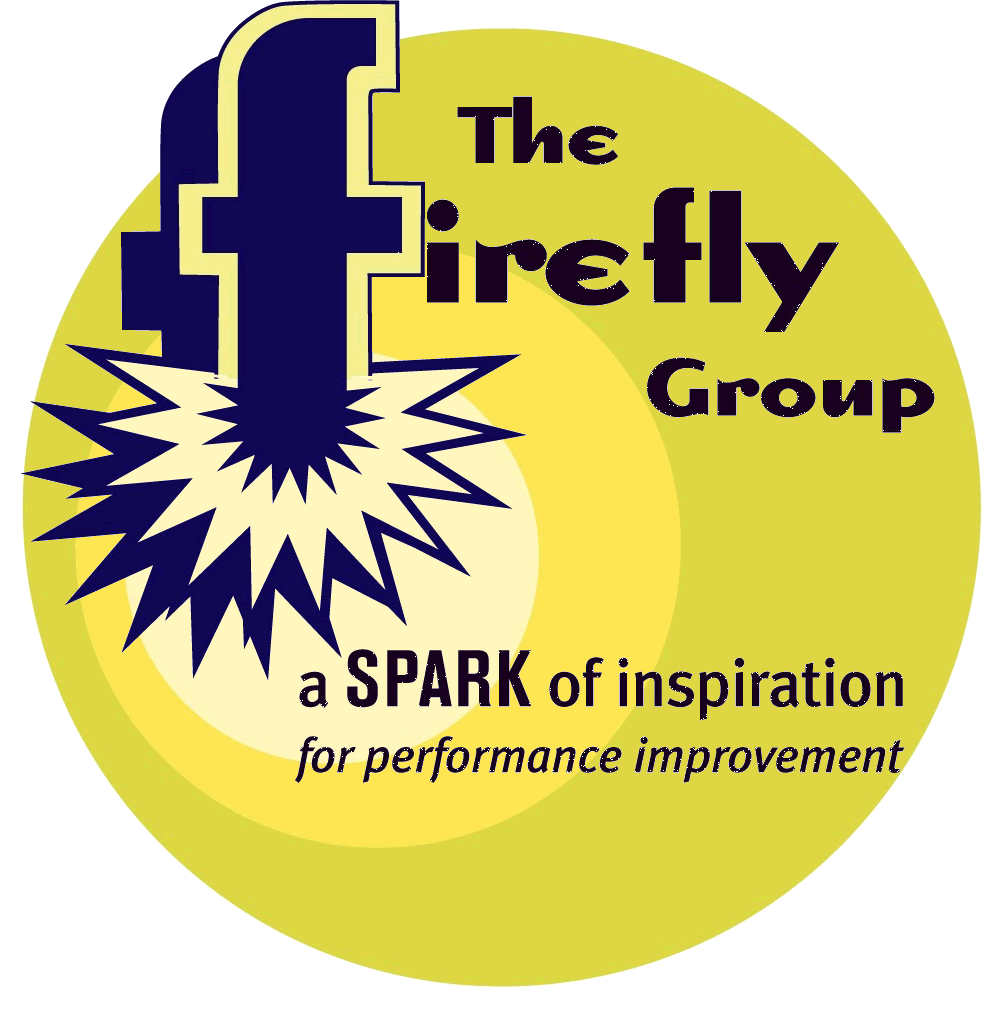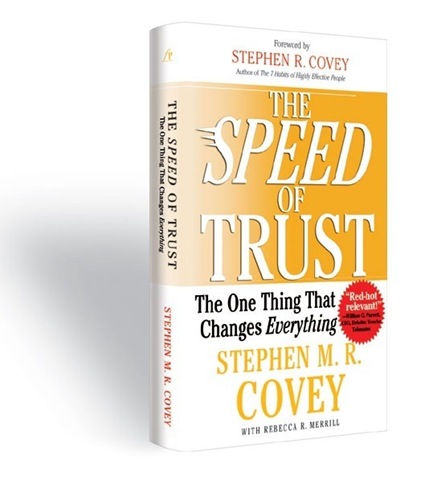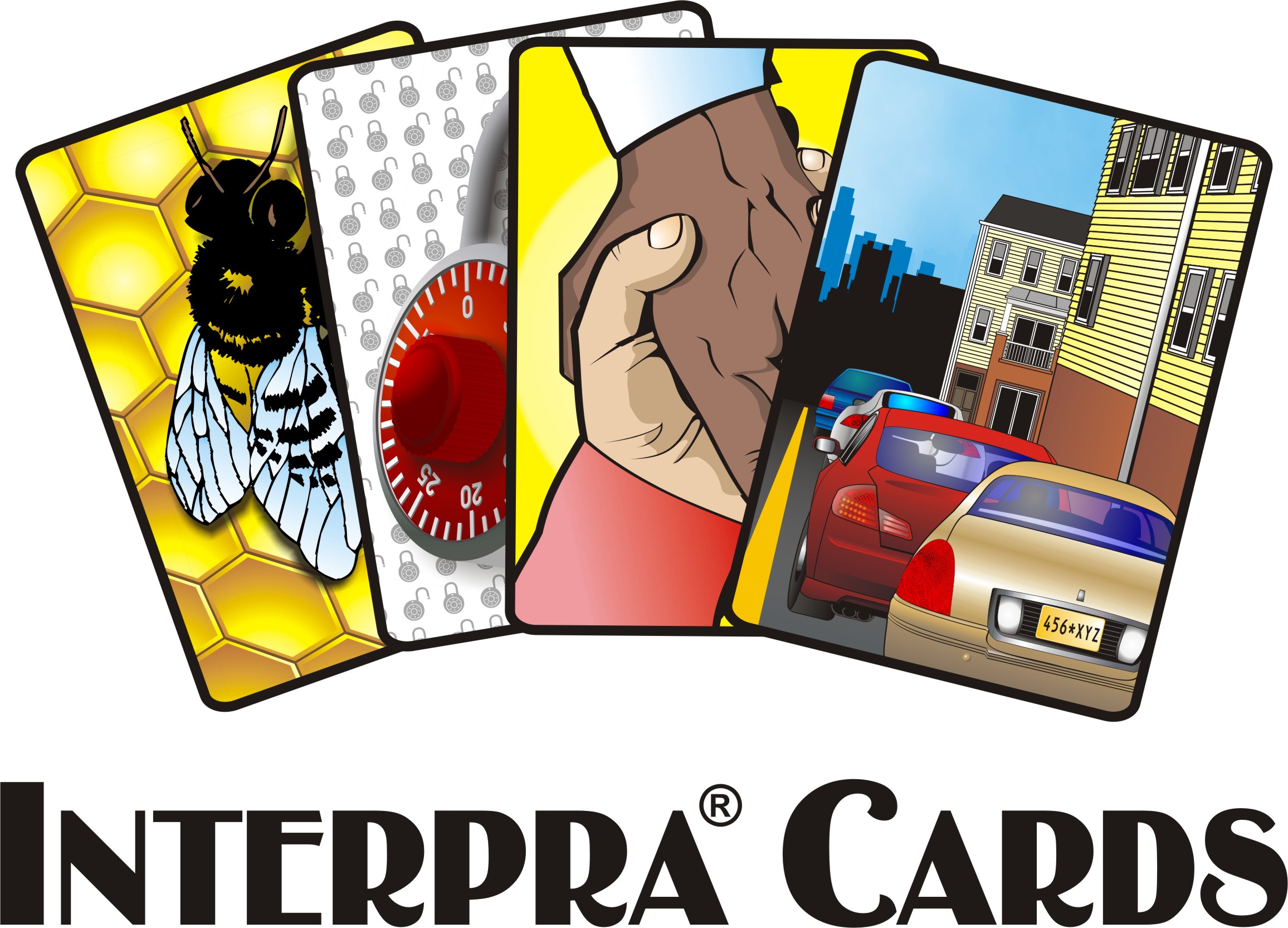


May 2010
BONUS: Reactions and responses to the April 2010 Firefly News Flash. See below.
In this Issue:
|
Say
It Quick |
Discoveries bits of serendipity to inspire and motivate |
Ideas fuel for your own continuous learning |
Activities tips and tricks you can try today |
| Faster Than... | Quicker than the Eye | Interview with Kurt Nemes | Now You See It, Now You Don't! |
This month I invite you to examine the everyday ripple effects of Trust, both when it is present and when it is not, beginning with this story in exactly 99 words.

Faster Thanů
Standing in line at the Batman Rollercoaster for 45 minutes, we were hot, sweaty, and brain numb listening to the Joker's theme song over and over. A few people began to leave. What was happening? Should we stay in line, get a return on our time investment? Should we leave and cut our losses?
"It'll be closed for hours," my daughter speculated. That was it. Instantly we were at the tail of a long line in the opposite direction as her words spread and people began to leave.
Our rumors and reputation spread faster than our actions!
 Quicker
than the Eye
Quicker
than the Eye
I've never associated either time or money with trust but that's exactly what Steven M.R. Covey does in his book The Speed of Trust. Covey's main point is that when trust is lacking, whatever we are doing will take longer. Why is this so? To insure that things will happen, we build safeguards, write contracts, craft a contingency plan, manage people more closely, and enforce consequences when results don't meet expectations.
And all this, of course, costs money and eats up time. By contrast, when trust levels are high, people do what needs getting done knowing they will be fairly compensated, adequately recognized, and properly appreciated for their efforts. This all makes sense from a business perspective and gives Covey's book a broad appeal. But his ideas also make sense for those who are in non-profits as well as for all of us at home and in communities.
Covey makes the case that trust is a combination of both character and competence. We trust people who have integrity and who can carry out their promises. Neither good character nor a reputation for results is sufficient alone to garner the trust one needs for successful relationships or business deals.
Covey goes into great detail about the actions and values that build character and competence sharing examples from well known business leaders as well as from his personal experience as a parent, husband, and community member. The text includes details about thirteen specific behaviors one can practice to increase the level of trust others have in you. These include ideas such as Talk Straight, Show Loyalty, Clarify Expectations, and Keep Commitments. And the book is peppered with quotes about trust from respected thinkers worldwide.
Though most of the book provides insight about trust on an individual and personal level, chapters are also devoted to trust in organizations, markets, and society. Of course trust can have its down side when people trust blindly or when trust has been broken. But Covey addresses these issues too, offering suggestions for avoiding such traps and providing ideas about how to restore trust when it has been lost.
Trust is a value most people would say they espouse. Yet few of us have taken the time to define it for ourselves. In Covey's book, readers have an opportunity for deep reflection plus many suggestions for enhancing what they will quickly realize is a necessary component of any positive relationship.
The Speed of Trust by Stephen M.R. Covey, Free Press, 2006. ISBN-13: 978-0-7432-9730-1
Interview with Kurt Nemes
 For
additional thinking about the issues surrounding trust, I turned to Kurt Nemes,
Senior Ethics Program Officer at The World Bank and asked him to react to
some of Covey's thinking. Here are Kurt's ideas.
For
additional thinking about the issues surrounding trust, I turned to Kurt Nemes,
Senior Ethics Program Officer at The World Bank and asked him to react to
some of Covey's thinking. Here are Kurt's ideas.
Brian: Covey's main premise is that a lack of trust results in higher costs and increased time to get things done. Do you agree?
Kurt: Of course. If a manager doesn't trust his or her staff, it results in micromanagement. Staff end up having to submit everything to the manager, who doesn't review but who spends hours rewriting all their work. Staff spend more time and energy worrying about what the manager is going to say. That makes them become unsure about the quality of their work. This leads to them becoming risk averse and in some cases they avoid talking to the manager for fear of being shot down. That is, they don't trust the manager to treat them like an autonomous adult. A vicious cycle starts and morale suffers, stress creeps in, and productivity is shot as each person is doing everyone else's work.
Brian: Covey says that one's integrity and intentions are not enough to foster trust. One also has to have the ability to produce results. To what extent do you agree with this notion of linking intention with results in order to engender trust?
Kurt: Most people want to do well and be a reliable team player. On top of that, no one wants to be the bearer of bad news or say no to a request. Thus, one might have the best intentions and promise to deliver something that they do not have the time, energy or resources to deliver. If you don't do what you say you are going to do, you've blown trust to bits. Someone said, "Under promise and over deliver." That seems better than over-promising and not delivering at all, or delivering an inferior product.
Brian: When you look at all the dimensions of ethics in business or organizational life, how big a role does trust play?
Kurt: I think it is fundamental. What often gets lost in discussions of trust, is trusting that your fellow worker is deep down a decent human being and motivated by the same things we are. Rushworth Kidder has done studies on values and when asked, people of every culture say they value the same things: honesty, trust, integrity, fairness, family, truth, transparency, community, etc. Trust is ultimately about having compassion for your fellow human being and treating them how you would like to be treated.
Brian: What's the best way to improve trust in a work setting?
Kurt: Being open and honest and most of all making sure that communications are two-way.
Brian: How does one go about establishing an environment of trust?
Kurt: By remembering our common values and aspirations. Then by demonstrating those values with one another.
Brian: Is trust in a work setting somehow different than in other settings such as at home?
Kurt: With your family, there is more at stake. However I imagine most people, worried about their finances, end up putting more energy into work and short-changing their families. Does anyone really want to be lying on their death bed and saying "I wish I had spent more time at work?" Unfortunately, many end up saying, "I wish I had spent more time with my family."
Brian: How would you asses our current "trust climate" as a society? Is trust at a higher or lower level than it has been in the past?
Kurt: If you read the newspapers or watch TV news, it would appear abysmal. However, the rise of social media and many of the grass root organizations seem actually to be bringing people together for the common good. Young people I meet care about making a change and creating a good world. Also the internet now allows us to meet people whom we might not have met or trusted otherwise, based on prior assumptions. Again, we see that there are universal values that unite us.
Brian: What are some instances when it might be good to be less trustful of others (or to extend less trust to someone else)?
Kurt: I can only think of a few instances where it might be an issue, and that would be in a war zone.
Brian: How much emphasis do you place on trust in your training programs at the World Bank? What are some techniques you use for teaching about trust?
Kurt: Trust is one of our core values, which we always cover in our training. As an international financial institution, the World Bank has many stakeholders who have put their trust in us to use donor funds to alleviate poverty. Our stakeholders include governments, civil society, vendors, poor people, and staff themselves. All have a stake in the success of the World Bank. If we don't honor our obligations to them, they will lose trust in the World Bank group. This is true for any business, but especially true because of our mission to help overcome poverty. The best teaching technique we use is case studies drawn from realistic situations staff face.
Brian: What have you found to be the biggest challenges for people as you teach about trust or raise the issue of trust with them at the World Bank?
Kurt: I don't find a challenge. When you fall back on demonstrating how we all share common values and you give staff the tools to solve problems, you've shown that you trust them to make rational decisions. They will then do the right thing, which is what ethics helps us do.
Kurt Nemes is an Ethics Program Manager at the World Bank Group, where he develops and delivers ethics training programs for staff. He has been involved in international education for over 30 years.
Now You See It, Now You Don't!
One measure of trust that is easily identified is reputation. Public figures, celebrities, and people in the news quickly gain a reputation - usually either positive or negative. We all have an opinion about whether we would trust them. Watch the news with a critical eye and you'll begin to see how fortunes rise and fall with reputation. Whom do you trust in the national healthcare debate in the U.S.? Well, who's talking and why should you trust them? What's their education, their experience, their self-interest, their reputation?
Equally fascinating is how much of North American news is dominated by what amounts to the demise of one person or another's reputation. Tiger Woods was an icon and modern legend until his affair was revealed a few months ago and his reputation fell faster than the Batman Rollercoaster from its pinnacle. Now he has the Promethean task of rebuilding his reputation in the eyes of his public, not to mention the now ever-suspicious gaze of his wife!
Reputation and trust are easily destroyed but difficult to re-build without considerable time, effort, and forgiveness. Consider these examples:
Japan's Prime Minister Shinzo Abe - On 9/12/07 Abe, a member of Japan's long dominant Liberal Democratic Party, stepped down after only a year in office following a wave of scandals and a humiliating election defeat. The prime minister had seen his approval rating plunge to a mere 30 percent. When he came to power, he had a 70% approval rating. Now his party, which has been in power since the end of WWII, is in total disarray.
Sammy Sosa, player with the Chicago Cubs - On 6/4/03 Sosa was found with a corked bat. One commentator wrote, "Fans will wonder which of his famous homeruns was illegal."
Martha Stewart, leader of a multimillion dollar publishing, fashion, and home improvement empire - On 6/4/02 Stewart was indicted for insider trading of Imclone stock. Martha was found guilty and spent time in prison. What impact have her actions had on the fortunes of her company? What has the company done to decrease the effects of her negative reputation while still capitalizing on her personal brand? Have consumers separated Martha's actions from the products of her business? How has the economic empire that relies upon her name recognition managed to keep its own reputation intact?
Fred Rogers, creator of the popular PBS TV show Mr. Roger's Neighborhood - Rogers was often the butt of jokes on shows like Saturday Night Live but when he died (summer 2003) every eulogy stressed how his public and private personalities were totally consistent; that he was a wonderful, caring, giving human being.
Jason Blair, reporter for the NY Times - Blair resigned 5/1/05 because of journalistic fraud & plagiarism. Howell Raines, Executive Editor and Gerald Boyd, Managing Editor also resigned.
George W. Bush, U.S. president - In June of 2006, George Bush experienced some of his lowest poll numbers ever - below 30%. Early that month, he officially designated the largest wildlife sanctuary of the United States, a huge area of several thousand square miles of the Pacific Ocean north of the Hawaiian Islands. His actions were unanimously applauded by environmentalists. Yet his polling numbers did not rise at all. Why? If people are upset with you, what does it take to rebuild your reputation? So now it's your turn!
As the activity for this month, look for an example of lost reputation or trust gained that's especially meaningful for you. When you find one, please send me a so I can share it with other readers.
Good luck and stay in touch!
The Activity for the April 2010 issue of the Firefly News Flash invited readers to experiment with one of the many picture-based processing tools featured that month. You can click here to see some responses to that activity - or add one of your own.
 In
addition, David Piltz of The Learning Key (www.thelearningkey.com/),
reminded me of another product worth including in the list of resources. Interpra
Cards are a deck of 40 picture cards used for facilitation, as a discussion
starter, or for deeper reflection. Use them to help participants tap into
both metaphorical learning and practical applications. There are three decks
to choose from: Communication & Negotiation, Teamwork, and Interpersonal.
The Learning Key also has a product called Picture
That! which is an alternative to roleplay activities. Cost: Interpra
Cards, $29.95; Picture That! $49.95. (If you order something from The Learning
Key, please use the following code: Firefly.)
In
addition, David Piltz of The Learning Key (www.thelearningkey.com/),
reminded me of another product worth including in the list of resources. Interpra
Cards are a deck of 40 picture cards used for facilitation, as a discussion
starter, or for deeper reflection. Use them to help participants tap into
both metaphorical learning and practical applications. There are three decks
to choose from: Communication & Negotiation, Teamwork, and Interpersonal.
The Learning Key also has a product called Picture
That! which is an alternative to roleplay activities. Cost: Interpra
Cards, $29.95; Picture That! $49.95. (If you order something from The Learning
Key, please use the following code: Firefly.)
Read
previous issues. Click Archives!
To add or delete your name to our mailing list, email
with a short note in the subject line.
We want this newsletter to be practical, succinct, and thoughtful. If you have suggestions about how we can meet these criteria, please let us know! Send us an with your thoughts and ideas.
Home
| Services
| Products
| Mission
| Ideas |
The Group
| The Buzz
(c)
2005 The Firefly Group